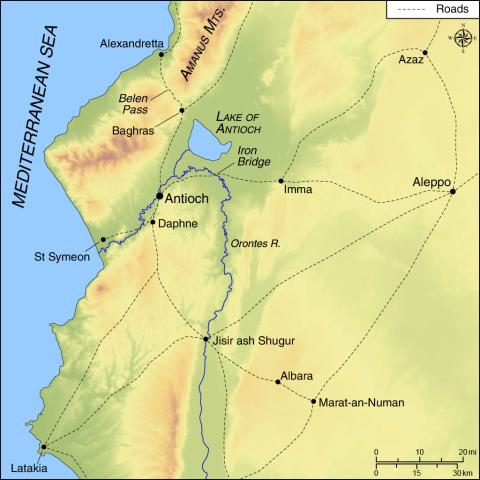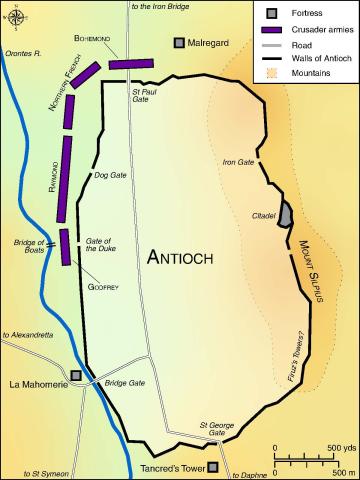The Crusaders Besiege Antioch
[7.18.3] Crastinā autem diē videntēs Turcī quod māiōrēs nostrī dēessent et quod preteritā diē īvissent ad portum, praeparāvērunt sē, et iērunt obviam illīs venientibus ē portū. Tunc videntēs comitem et Boamundum, venientēs et condūcentēs illam gentem, mox coepērunt strīdēre et garrīre ac clāmāre vehementissimō clāmōre, circumcingendō undique nostrōs, iaculandō, sagittandō, vulnerandō, et crūdēliter dētruncandō. Nam tam ācriter invāsērunt nostrōs ut illī inīrent fugam per proximam montaneam et ubi via eundī patēbat. Quī potuit celerī sē gressū expedīre, ēvāsit vīvus: quī vērō fugere nequīvit, mortem suscēpit. Fuēruntque in illā diē martyrīzātī, ex nostrīs mīlitibus seu peditibus, plūs quam mīlle, quī, ut crēdimus, in caelum ascendērunt, et candidātī stolam martyriī recēpērunt.
[7.18.4] Itaque Boamundus viam quam tenuerant nōn tenuit, sed celerius cum paucīs mīlitibus ad nōs vēnit, quī erāmus in ūnum congregātī. Tunc nōs accēnsī occīsiōne nostrōrum, Chrīstī nōmine invocātō et Sānctī Sepulchrī cōnfīdentēs itinere, iūnctī simul, pervēnimus contrā eōs ad bellum, eōsque invāsimus ūnō corde et animō. Stābant vērō inimīcī Deī et nostrī, undique iam stupefactī et vehementer perterritī, putantēs nostrōs sē dēvincere et occīdere, sīcut fēcerant gentem comitis et Boamundī. Sed Deus omnipotēns hoc illīs nōn permīsit. Mīlitēs igitur vērī Deī, undique signō crucis armātī, irruērunt ācriter super illōs et fortiter invāsērunt. Illī autem celeriter fūgērunt, per medium angustī pontis, ad illōrum introitum.
notes
(March 1098) The Turks attack Bohmond and Raymond of Toulouse as they return from St. Symeon's Port; many of the crusaders run away, and more than a thousand are killed. Bohemond returns to the main camp and inspires the crusaders (including our author) to attack the Turks. The Turks think they will defeat this contingent as well, but are routed, and flee over a bridge into the city.
7.18.3
Quī potuit ... expedīre: = (ille) qui potuit ... expedire.
et candidātī stolam martyriī recēpērunt: "dressed in white, they received the robe of martyrdom"; compare Revelation 6.11: et datae sunt illis singulae stolae albae.
7.18.4
viam quam tenuerant nōn tenuit: i.e., he went by a different route.
Sānctī Sepulchrī cōnfīdentēs itinere: "trusting in the journey of the Holy Sepulchre"; they remembered that their main objective was to go to (and liberate) Jerusalem.
inimīcī Deī et nostrī: "enemies of God and also of us"; objective gens.
putantēs nostrōs sē dēvincere et occīdere = putantēs sē dēvincere et occīdere nostrōs. CL would be putantēs sē dēvictūrōs et occīsūrōs nostrōs.
sīcut fēcerant gentem comitis et Boamundī: this is the crusader defeat described in 7.18.3 above.
per medium angustī pontis: "through the middle of the narrow bridge"; This seems to be the bridge leading to the Bridge Gate. I don't know if it was objectively narrower than other bridges, or whether it just seemed narrow because of the number of fleeing Turks. See 7.18.5.
ad illōrum introitum: “to their entryway,” i.e., to the gate by which they entered the city.
vocabulary
7.18.3
expediō expedīre expedīvī (expediī) expedītum: to disentangle; release, extricate
candidō: to whiten
stola stolas, f.: robe
7.18.4
itaque: and so, well then (often used when the narrative resumes after a digression, OLD 2)


